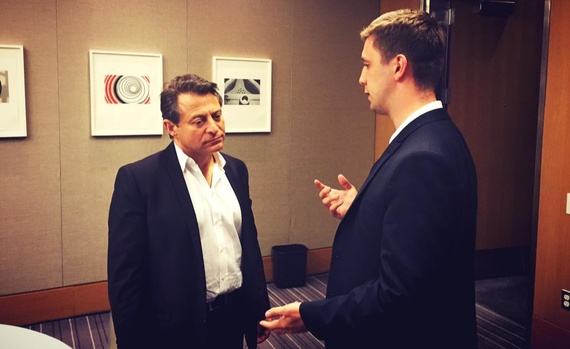At this year's Exponential Finance conference hosted by Singularity University in New York, I had the opportunity to talk with Peter Diamandis, co-founder & Executive Chairman of Singularity University. Diamandis counsels the world's top enterprises on how to utilize exponential technologies and incentivized innovation to dramatically accelerate their business objectives.
Diamandis is also the Chairman and CEO of the XPRIZE Foundation, which leads the world in designing and launching large incentive prizes to drive radical breakthroughs for the benefit of humanity. He attended MIT where he received his degrees in molecular genetics and aerospace engineering, as well as Harvard Medical School where he received his M.D.
Patrick Daniel: In addition to prizes such as the XPRIZE, what are some incentive systems that can enable innovation for big, capital-intensive companies?
Peter Diamandis: Another incentive is advance market commitments. If you build a product or service that delivers this quality of service, we will buy a hundred million of them. That is effectively equivalent to incentive completion, but it is an advance purchase order.
Daniel: What is stopping the next generation of game changing companies from occurring?
Diamandis: I don't think there is much or anything that is stopping them. I think the rate of innovation is increasing. I think the number of companies that are trying bigger things is increasing. I don't think there are any roadblocks per se. There is capital available, technology is available and the number of marketplaces is increasing.
Daniel: What is the best way to learn first principles thinking?
Diamandis: I think first principles thinking is really important. I write about that in my last book Bold. I think it comes from the type of training that makes it easiest, being an engineer, being a physicist, really understanding, asking a question the most fundamental level. What are the constraining factors here? What do the laws of physics tell me? Or what does mathematics tell me. We teach exponential thinking at Singularity University in our graduate program and our executive program.
Daniel: This is a Peter Thiel type of question. What important truth do very few people on Wall Street agree with you?
Diamandis: That very few things are truly scarce, that we can turn almost anything from scarcity into abundance and that there are great business opportunities by embracing that truth.
Daniel: What are you worried about?
Diamandis: I think the biggest challenge I see is attempts by governments to regulate too much before the product matures. I think the type of change that is coming is going to threaten a lot of the incumbents and they are going to put up roadblocks.
Daniel: Within financial technology, what kind of innovation can empower individuals?
Diamandis: Wouldn't it be great if there were an AI that understood your desire and wants? Even if you didn't verbalize it, your ability to have your desires and intentions materialized.
Daniel: What is a book that you would require the president to read to understand this technology revolution?
Diamandis: The book that I read that got me really focused was Ray Kurzweil's The Singularity is Near. It did a great job of giving people an overview of the conversion of all these technologies.
Daniel: How do you know what to incentivize?
Diamandis: You incentivize your desired outcome. What do you want to see? Do you want to see employment or do you want to see a higher standard of living? Being clear what you desire is the first step.
Daniel: When you look back at your life, what is the change in your mindset that you think was pivotal for your success?
Diamandis: That is a good question, I think the notion that hard work could overcome most obstacles.
Daniel: What habit would you prescribe to guard against your own biases and beliefs?
Diamandis: When enough people tell you something, it is okay to actually take a moment to evaluate why they are right or why they are wrong. And the beautiful thing about the world we live in today is our ability to constantly pivot. To do experiments, gather the data and then modify based on what you learned. It is a constant iteration. That has driven my life.
Daniel: If you could give your younger self advice, what kind of advice would you give yourself?
Diamandis: Great question. I think it has to do something with my passion and not what my parents or my teachers were telling me to do. Follow my heart. I think that is the most important thing, doing something driven by my passion more than anything else.


